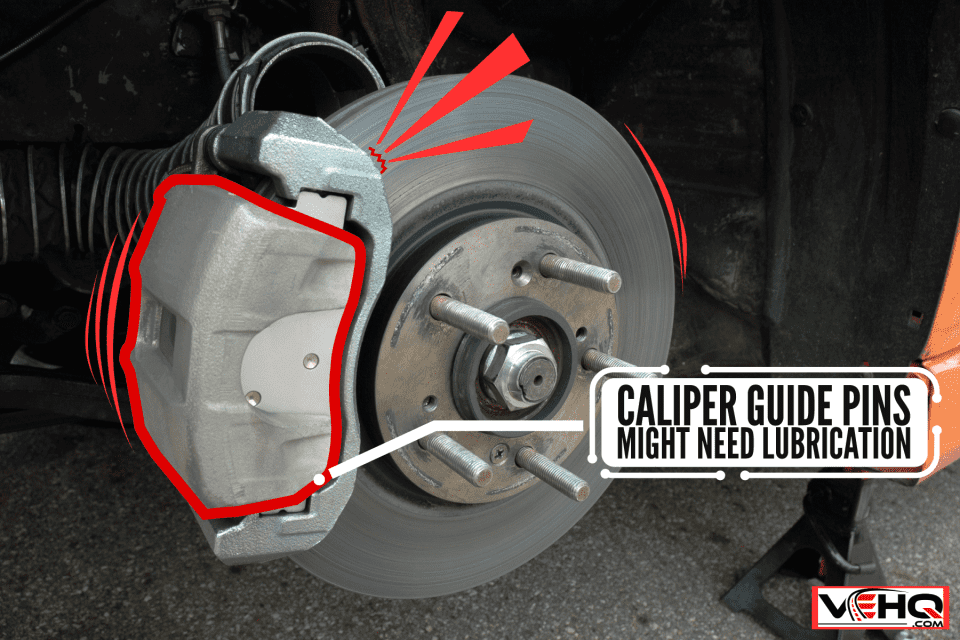Creaking Noise When Braking At Low Speeds

That unsettling creaking noise that emanates from your car’s brakes as you gently roll to a stop can be more than just an annoyance. While sometimes innocuous, it can also be a symptom of underlying issues that, if left unchecked, could compromise your vehicle's braking performance and your safety. Understanding the potential causes of this low-speed braking creak is crucial for both car owners and automotive professionals.
Common Culprits Behind the Creaking
Several factors can contribute to creaking noises during low-speed braking. Here's a breakdown of the most common:
- Brake Pad Issues: This is often the primary suspect. Several pad-related problems can induce creaking.
- Glazed Pads: Repeated hard braking can cause the brake pad material to overheat, leading to a glassy, hardened surface known as glazing. This reduces the friction coefficient and can cause a creaking or squealing sound.
- Hardened Pad Material: Some brake pad compounds, particularly those found in cheaper aftermarket options, can become overly hard over time. This hardness makes them vibrate against the rotor, resulting in the noise.
- Worn Pads: As brake pads wear down, the backing plate (the metal part that holds the friction material) can start to rub against the rotor, causing a grinding or creaking sound. This is a serious issue that requires immediate attention.
- Improper Installation: Even new pads can creak if not installed correctly. Insufficient lubrication on the backing plate, shims, or caliper slides can lead to friction and noise.
- Brake Rotor Problems: The condition of your brake rotors also plays a significant role.
- Rotor Rust: Surface rust, which is common after the car sits for a while, can create a temporary creaking noise that usually disappears after a few braking applications.
- Warped Rotors: While "warped" rotors are often a misnomer (rotor thickness variation is more accurate), uneven rotor surfaces can cause vibration and noise. However, warped rotors usually cause pulsation felt in the brake pedal, in addition to noise.
- Rotor Grooves: Deep grooves or scoring on the rotor surface can interfere with smooth pad contact, leading to noise.
- Caliper Issues: The brake caliper is responsible for pressing the pads against the rotor. Problems here can definitely be a source of noise.
- Sticking Caliper Slides: Caliper slides allow the caliper to move freely and apply even pressure to the brake pads. If these slides become corroded or lack lubrication, the caliper can bind, causing uneven pad wear and noise.
- Sticking Caliper Piston: Similarly, a sticking caliper piston can prevent the brake pads from fully releasing, leading to constant friction and potential creaking.
- Suspension Components: Sometimes, the creaking sound isn't directly from the brakes themselves, but rather from nearby suspension components.
- Worn Bushings: Worn or dry suspension bushings (e.g., control arm bushings, sway bar bushings) can creak as they flex during braking, especially at low speeds when weight transfer is more pronounced.
- Loose Suspension Components: A loose ball joint or tie rod end can also generate noise under braking force.
Diagnosing the Creaking: A Systematic Approach
Pinpointing the exact cause requires a systematic approach. Start with a visual inspection of the brake pads and rotors. Look for signs of wear, glazing, rust, or scoring. Pay close attention to the thickness of the pads. If anything looks suspicious, remove the wheels and inspect the calipers. Check the caliper slides for free movement and lubricate them if necessary. Inspect the suspension components for any signs of wear or looseness. If the noise persists, consider a test drive with a qualified mechanic who can listen for the noise and perform further diagnostics using tools like a stethoscope to isolate the source.
Real-World Examples
I recently encountered a 2018 Honda Civic with a low-speed braking creak. A quick inspection revealed that the front brake pads were heavily glazed due to aggressive driving habits. Replacing the pads with a higher-quality ceramic compound and resurfacing the rotors solved the problem. In another instance, a 2012 Toyota Camry exhibited the same symptom. This time, the culprit was corroded caliper slide pins, preventing the calipers from releasing properly. Cleaning and lubricating the pins resolved the issue.
Prevention and Maintenance
Preventative maintenance is key to minimizing brake noise. Regular brake inspections, proper lubrication of caliper slides, and using quality brake pads and rotors can significantly reduce the likelihood of creaking noises. Avoid aggressive braking habits whenever possible to prevent pad glazing. Furthermore, ensure that your suspension components are in good condition to prevent noises originating from worn bushings or loose joints.
When to Seek Professional Help
While some brake noises are harmless, others indicate serious problems. If you're unsure about the cause of the creaking, or if the noise is accompanied by other symptoms such as pulsating brake pedal, pulling to one side during braking, or a grinding sound, it's best to seek professional help from a qualified mechanic. Ignoring these symptoms can lead to more extensive damage and potentially compromise your safety.
